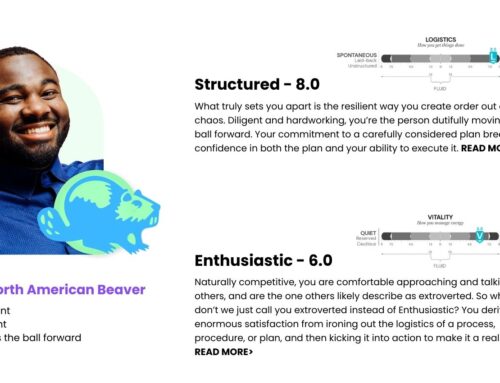An Ode to Quiet Personalities
In this noisy, hyperactive, in-your-face world of ours, do you:
- Regularly feel drained by too much commotion?
- Avoid large, impersonal gatherings and the small talk that comes with them?
- Find descriptions of you as a social misfit unfair or inaccurate?
- Yearn for alone time or intimate gatherings with close friends or family?
If any (or all) of these ring true, take heart, you’re not alone (though you’re certainly OK with being alone). You’re what we call a Quiet personality, and the science says a key ingredient of your personality is energy management.
Translation: your batteries are emptied by too much stimulation and are recharged by more solitary, thoughtful pursuits.
Much More Than an Introvert
In her groundbreaking book, Quiet: The Power of Introverts in a World That Can’t Stop Talking, author Susan Cain describes Quiet personalities as deeply sensitive souls who are far more interested in nurturing a rich inner life than in pursuing material pursuits.
 As Cain puts it, while solitude is important to many if not most people, for Quiet personalities “it is the air they breathe.”
As Cain puts it, while solitude is important to many if not most people, for Quiet personalities “it is the air they breathe.”
Like the title of Cain’s book, you’ve likely been told you’re an introvert. And that’s true – to a point. You do, in fact, possess introverted qualities.
But the days of being typecast as either an introvert or an extrovert are, mercifully, coming to an end. And frankly, they never should have started, because that type-based system gave millions of people the mistaken impression they were wholly one type of personality or the other. And that’s simply untrue.
The Vitality Trait
Again, Quiet is all about energy: how you get it, hold onto it, and replace it when you’re running low.
This is why we place Quiet and Enthusiastic at the polar opposites of the Vitality trait. Some of us are vitalized – or energized, if you prefer – by quieter, more thoughtful practices, while others get amped up by high-octane, light-your-hair-on-fire activities.

And there’s nothing right or wrong with either personality leaning. As with all personality traits, you had nothing to do with the makeup of your personality. Some of it was baked into your DNA, the rest was engineered into you as a child. What matters most is understanding your personality and how it impacts your life.
This is why the Quiet description is a far better description of your personality than introversion alone. As a Quiet person, you might do everything in your power to avoid large gatherings of strangers. Yet in a different, more intimate gathering of like-minded personalities, you may become the proverbial life of the party.
Social Sophisticates
Another fiction of introversion we’d love to see die: the idea that Quiet people are social loners or wallflowers incapable of engaging with the world around them. Wrong!
Quiet people can be just as socially competent as their more outgoing counterparts, and in many cases more so.
Why? For the simple reason more outgoing types – busy as they are commanding the room – completely miss all the nonverbal communication that tell Quieter people what’s really going on.
Or as Cain writes, Quieter people “tend to notice subtleties that others miss – another person’s shift in mood, say, or a lightbulb burning a touch too brightly.”
And because Quiet personalities are generally very careful about sharing their thoughts until they are fully formed, when they do speak their words are usually more meaningful. Or as Cain writes, “There’s zero correlation between being the best talker and having the best ideas.”
A Cautionary Note
So if you’re a Quiet personality in a culture hellbent on turning us all into outgoing extroverts, remind yourself that you’re perfectly fine just the way you are. Furthermore, you’ve got a lot to add to the human equation, so bring it – when you’re good and ready.
One note of caution: because the squeaky wheel does in fact get the grease, remind yourself that in some instances you really do need to learn how to speak up early and often.
In a professional setting, for example, management isn’t going to notice you unless you chime in with ideas and suggestions of your own. You don’t always have to wait until your thoughts are fully formed – in fact, even half-baked they’re likely to be more meaningful than the words of those who more or less ‘think out loud.’
And in more personal settings, if you’ve got your eye on a special someone, you’ll need to speak up to get noticed. Being a Quiet personality can be very attractive to others – but complete silence will give the impression you don’t care at all (when, ironically, you’re often the one who cares the most).
An Ode to Quiet Personalities
In this noisy, hyperactive, in-your-face world of ours, do you:
- Regularly feel drained by too much commotion?
- Avoid large, impersonal gatherings and the small talk that comes with them?
- Find descriptions of you as a social misfit unfair or inaccurate?
- Yearn for alone time or intimate gatherings with close friends or family?
If any (or all) of these ring true, take heart, you’re not alone (though you’re certainly OK with being alone). You’re what we call a Quiet personality, and the science says a key ingredient of your personality is energy management.
Translation: your batteries are emptied by too much stimulation and are recharged by more solitary, thoughtful pursuits.
Much More Than an Introvert
In her groundbreaking book, Quiet: The Power of Introverts in a World That Can’t Stop Talking, author Susan Cain describes Quiet personalities as deeply sensitive souls who are far more interested in nurturing a rich inner life than in pursuing material pursuits.
 As Cain puts it, while solitude is important to many if not most people, for Quiet personalities “it is the air they breathe.”
As Cain puts it, while solitude is important to many if not most people, for Quiet personalities “it is the air they breathe.”
Like the title of Cain’s book, you’ve likely been told you’re an introvert. And that’s true – to a point. You do, in fact, possess introverted qualities.
But the days of being typecast as either an introvert or an extrovert are, mercifully, coming to an end. And frankly, they never should have started, because that type-based system gave millions of people the mistaken impression they were wholly one type of personality or the other. And that’s simply untrue.
The Vitality Trait
Again, Quiet is all about energy: how you get it, hold onto it, and replace it when you’re running low.
This is why we place Quiet and Enthusiastic at the polar opposites of the Vitality trait. Some of us are vitalized – or energized, if you prefer – by quieter, more thoughtful practices, while others get amped up by high-octane, light-your-hair-on-fire activities.

And there’s nothing right or wrong with either personality leaning. As with all personality traits, you had nothing to do with the makeup of your personality. Some of it was baked into your DNA, the rest was engineered into you as a child. What matters most is understanding your personality and how it impacts your life.
This is why the Quiet description is a far better description of your personality than introversion alone. As a Quiet person, you might do everything in your power to avoid large gatherings of strangers. Yet in a different, more intimate gathering of like-minded personalities, you may become the proverbial life of the party.
Social Sophisticates
Another fiction of introversion we’d love to see die: the idea that Quiet people are social loners or wallflowers incapable of engaging with the world around them. Wrong!
Quiet people can be just as socially competent as their more outgoing counterparts, and in many cases more so.
Why? For the simple reason more outgoing types – busy as they are commanding the room – completely miss all the nonverbal communication that tell Quieter people what’s really going on.
Or as Cain writes, Quieter people “tend to notice subtleties that others miss – another person’s shift in mood, say, or a lightbulb burning a touch too brightly.”
And because Quiet personalities are generally very careful about sharing their thoughts until they are fully formed, when they do speak their words are usually more meaningful. Or as Cain writes, “There’s zero correlation between being the best talker and having the best ideas.”
A Cautionary Note
So if you’re a Quiet personality in a culture hellbent on turning us all into outgoing extroverts, remind yourself that you’re perfectly fine just the way you are. Furthermore, you’ve got a lot to add to the human equation, so bring it – when you’re good and ready.
One note of caution: because the squeaky wheel does in fact get the grease, remind yourself that in some instances you really do need to learn how to speak up early and often.
In a professional setting, for example, management isn’t going to notice you unless you chime in with ideas and suggestions of your own. You don’t always have to wait until your thoughts are fully formed – in fact, even half-baked they’re likely to be more meaningful than the words of those who more or less ‘think out loud.’
And in more personal settings, if you’ve got your eye on a special someone, you’ll need to speak up to get noticed. Being a Quiet personality can be very attractive to others – but complete silence will give the impression you don’t care at all (when, ironically, you’re often the one who cares the most).



